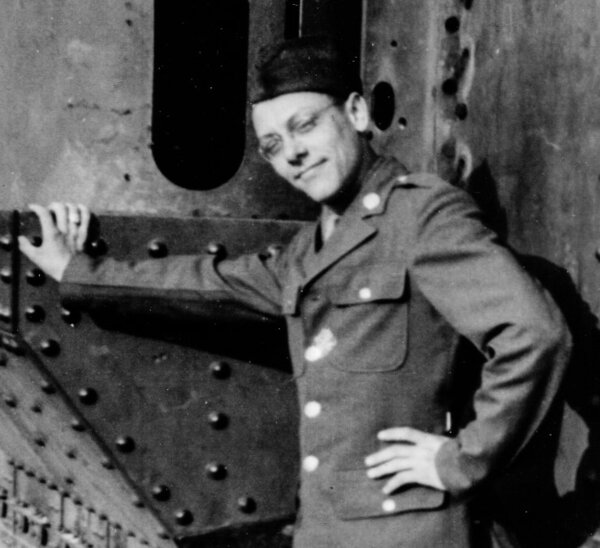Alfred Gallagher "Spike" Berry

T/4 in Signal Co, Special : Radio A
Military occupational specialty: 740 (radio operator, intermediate speed)
ASN#17150923
Born 1924 in ND, Died 2014
County of residence at enlistment: Stutsman County, ND
Other residence(s): Jamestown, ND; Watertown, SD; Las Vegas, NV
United States Army, European Theatre of Operations
Occupation before the war: foremen, n.e.c.
College education before the war: Jamestown College (ND) 1 year
Spike Berry was born on November 21, 1924 in Wishek, ND. He was one of a set of twins—the fourth and fifth children born to Carolina and Bernhardt Krenzler, German-speaking immigrants from Russia. Sadly, Carolina died less than two weeks after the twins were born, and Spike was adopted by Emery and Betty Berry who lived in Jamestown, ND. His twin brother was adopted by another Jamestown family. The older children (all pre-schoolers) stayed with Bernhardt. Despite their separation at birth, Spike’s nephew Randy reports that “the two remained lifelong brothers and best friends.”
Spike graduated from Jamestown High School and attended Jamestown College for a year. His experience as a projectionist in high school, and his part-time job as a weekend radio announcer, would stand him in good stead once he enlisted in the Army. His radio experience got him sent to radio school. He was one of 288 operators selected from 600 or so others who had graduated from radio school and were sent to Camp Forrest for further winnowing. He was interviewed by Fred Fox, and "I was one of the lucky 288!" And so he found himself in the Signal Company Special.
In a 2006 interview, Spike said that, for the Ghost Army deceptions, "radio was the stage setter. . . . We're the silent orchestra underneath the musical on the stage."
Spike's high school projection experience got the 20-year-old soldier nominated to find films to show the men of the Ghost Army. The unit had managed to "liberate" a projector, and Spike went off in search of movies. "So I went to the different corps film depots, and they were less than enthused about my requests, because only 1200 men, and 'What’s this– We never heard of the 23rd Special Troops.' So we were unheard of and unwanted, and out there all by ourselves with no film to show on our projector. But I finally got a few prints. And you had to return them by 11 o’clock the next day. So Bob Conrad (Lieutenant Conrad), who was in charge of the motor pool, saw to it that I had a jeep and a driver, and I got those films back at 11 o’clock the next day, wherever it was. That [may mean] getting up at 3 or 4 in the morning and driving, but we got those films back on time. Because we had to be good, or we wouldn’t get films."
Spike told a story about his closest call during the war. "We were stationed in Luxembourg, and I was going to return this film, which I always did at 11 o’clock every day. And I went into this town, and I always stopped at a bakery . . . and bakery’s closed. And I went down the block . . . and film library was closed. Gone, nobody there. I thought, well, hell, what’s going on here? And so I went to the middle of the town, a little square, and there was an MP there. And I said, 'What’s going on here?' He said, 'What the hell are you doing here?' I said, 'I’m returning a movie film.' He said, 'You’re returning what?' I said, 'I’m returning a movie film.' He said, 'Listen, sir, you get that constant submachine gun that’s in your leather holster along your spare tire, put oil on it and get it running, get it operational. And then you and your driver get the hell out of town.'"
That was in Bastogne, shortly before it was surrounded by the Germans. Spike did get the film back, driving through winter storm conditions, though it was about two hours late.
Spike was discharged from the Army with the rank of T/4 on October 30, 1945, three weeks before his 21st birthday. He returned to Jamestown and worked at the local radio station, KSJB. He would spend decades in the radio industry in the Dakotas, California, and Hawaii, working as an on-air personality and in sales, and owning (with a couple of partners) radio station KSDN in Watertown, SD, which they purchased in 1966.
He was an active member of the community in Jamestown, serving as secretary and later as president of the Jamestown Chamber of Commerce. He was also a long-time member of the Elks Lodge.
Spike moved to Hawaii in the 1970s and spent 20 years there. He started a travel business, organizing cruises and group trips. He was also involved in real estate.
In retirement he moved to Las Vegas, NV where he enjoyed entertaining friends and family. He died on March 3, 2014 in Las Vegas and is buried at Highland Home Cemetery in Jamestown, ND.
Want to know more? Watch the Rick Beyer interview with Spike Berry.
Sources:
1920 census showing his birth family
1930 census
1937 birth parents' Find a Grave record
1942 enlistment record (note that birthdate and birth place are wrong in this version)
https://www.fold3.com/record/84672112/alfred-g-berry-wwii-army-enlistment-records
1945 draft card
1963 article in the Bismarck Tribune (ND)
https://www.newspapers.com/image/413765708/?terms=spike%20berry&match=1
1966 article in the Rapid City Journal (SD) re his purchase of KSDN
https://www.newspapers.com/image/351084569/?terms=alfred%20g%20berry&match=1
2014 Find a Grave record
https://www.findagrave.com/memorial/127749907/alfred-gallagher-berry